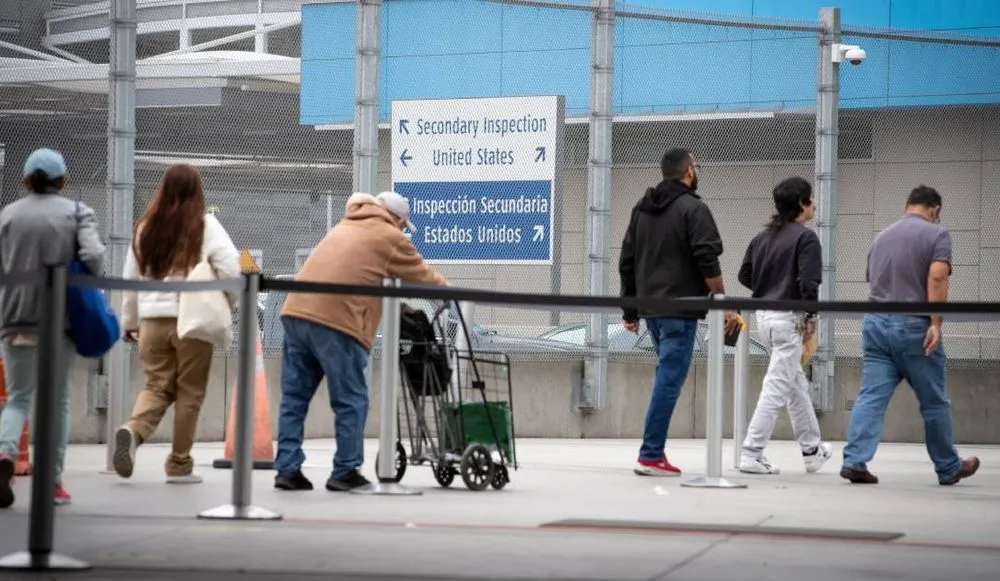Homeland Security has collected DNA data from 1.5 million immigrants in four years, researchers find
The Department of Homeland Security (DHS) has captured DNA data from more than 1.5 million immigrants over the last four years and stockpiled it in a database used in criminal investigations, according to new research.
Since a Trump administration rule mandating the collection of all detained immigrants’ DNA went into effect in 2020, the number of DNA profiles collected by the agency has shot up 50-fold from just 30,000 total samples collected over 15 years prior to the rule change, the Georgetown Law Center on Privacy & Technology found.
DHS has begun taking DNA from nearly every immigrant detained, even if only very briefly, the researchers said.
The authors of the Georgetown report are calling on the Biden administration to reverse the Trump rule and to expunge the data the government now holds on a vast swath of immigrants who have committed no crimes yet have been forced to turn over genetic information.
Many of the immigrants whose DNA has been collected did not understand that it was being used to populate a criminal database known as the Combined DNA Index System (CODIS), according to report co-author Emerald Tse, who said her team interviewed many immigrants and advocates about their experience with the DNA collection program.
The CODIS database is available to international law enforcement as well as those investigating crimes domestically at the local, state and federal levels.
While DHS has internal guidelines requiring its agents to tell immigrants their DNA is being taken, many immigrants told Tse’s team they were not informed, she said in an interview with Recorded Future News.
“Many of the people that we interviewed did not see written notices and they were not verbally told that their DNA was taken either,” Tse said. “Many of the people that we spoke to reported being very confused and scared and some people believed that when they were getting cheek swabs it was to test for illness.”
The government stores DNA samples indefinitely, which the Georgetown researchers call dangerous given how quickly the technology is advancing and the dearth of laws restricting what the government can do with the samples.
The immigrants whose DNA is taken can be detained without probable cause, raising serious constitutional questions,Tse said.
“They don't have to prove anything to a neutral judge,” Tse said. “They can just detain someone based on a single CBP (Customs and Border Protection) or ICE (Immigration and Customs Enforcement) agent deciding that someone should be subjected to detention.”
DHS did not respond to a request for comment.
The DNA collection program extends not just to people trying to come into the U.S., but any immigrant detained in almost any setting, Tse said. Immigrants who have been forced to turn over DNA swabs have included people driving through border checkpoints or going through customs at the airport who have been stopped for questioning.
“There are a lot of different scenarios where people get stopped by immigration enforcement and that still constitutes detention … it sweeps in so many people,” Tse said.
DHS does not report data showing the race, ethnicity and nationality of the people from whom it collects DNA, Tse said, but she asserted that because most of the people detained by CBP and ICE are crossing the U.S. border with Mexico it is not hard to extrapolate that the program disproportionately impacts communities of color.
“These communities are already overpoliced, and oversurveilled so what this expansion of DNA collection means is that policing in those communities will intensify,” Tse said.
She added that the DNA collection program comes against the “backdrop of a very long history of U.S. immigration law and policy targeting various racialized immigrant groups.”
Suzanne Smalley
is a reporter covering digital privacy, surveillance technologies and cybersecurity policy for The Record. She was previously a cybersecurity reporter at CyberScoop. Earlier in her career Suzanne covered the Boston Police Department for the Boston Globe and two presidential campaign cycles for Newsweek. She lives in Washington with her husband and three children.



